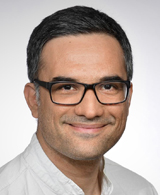BrainsCAN Fellows
BrainsCAN is bringing the world's most promising early career cognitive neuroscientists to Western University through the Postdoctoral Fellowship Program. Training the next generation of researchers is a key aim of BrainsCAN, and its fellows are the engines of innovative research.
In fall 2017, the first set of fellows joined the program under the designation of a BrainsCAN Fellow or Postdoctoral Associate.
Learn about the BrainsCAN Fellows and their research.
Current BrainsCAN Fellows:
Priya Kalra, Emily Nichols, Ana Luísa Pinho, Ashley Schormans
Former BrainsCAN Fellows:
Olamide Adebiyi, Craig Allen, Justine Cléry, Marta De Felice, Sarah Hayes, Chenxi He, Björn Herrmann, Kaitlin Laidlaw, Pan Liu, Cassandra Lowe, Liya Ma, Jie Mei, Daniel Miller, Aline Miranda, Mina Nashed, Amy Reichelt, David Schaeffer, Nichole Scheerer, Mojtaba Soltanlou, Kasey Van Hedger, Stephen Van Hedger, Eric Wilkey, Jeff Weiler, Yiming Xiao
Current BrainsCAN Fellows

Priya Kalra
BrainsCAN Fellow (2021—Present)
EdD, Human Development and Education - Harvard Graduate School of Education
The role of the medial temporal lobe in implicit learning: mechanisms and representations
Supervisor(s): Dr. Paul Minda, Dr. Laura Batterink, Dr. Marc Joanisse
Research Information:
Implicit learning — that is, learning without effort or awareness of what has been learned — plays an important role in many domains, including first language acquisition. There is increasing evidence that developing expertise or fluency in these domains involves not only the accumulation of information, but changes in the way that information is represented. For example, experts emphasize relevant features over irrelevant features and often use higher-order representations of the stimuli (such as "chunks"). However, the computational and neural mechanisms of these representational changes are not well understood. I will use a combination of behavioral, computational, and neuroimaging techniques to characterize these shifts. Understanding these changes in representation is critical to designing more effective methods of instruction and training.

Emily Nichols
BrainsCAN Fellow (2021—Present)
PhD, Psychology - Western University
Functional connectivity in fetal growth restriction: association with delivery times and long-term language outcomes
Supervisor(s): Dr. Emma Duerden, Dr. Sandrine de Ribaupierre
Research Information:
Intrauterine growth restriction (IUGR) is a serious condition where the placenta stops growing late in pregnancy, limiting oxygen to the fetal brain. In the early stages of IUGR, blood flow is still being directed to the frontal lobes. Later, however, blood is directed to midbrain areas important for keeping the fetus alive. This redistribution referred to as 'brain sparing'. Brain sparing can result in severe brain injury, with adverse consequences for cognitive function, including language. For these fetuses, early delivery can prevent death; however premature birth also comes at a cost. The neonatal ICU is a stressful environment, and preterm babies are at risk of both short- and long-term health issues. Objective measures to guide decisions regarding delivery time to maximize developmental outcomes are crucial to neonatal care in this population. My research aims to evaluate whether brain sparing is associated with decreased functional and structural connectivity in the language network in utero, and if connectivity measures are associated with language outcomes at 12- and 24-months. By using MRI-based methods to monitor fetuses at risk for IUGR, and following the developmental trajectory of the newborns, I aim to improve newborn brain health and cognitive outcomes, specifically later language development.

Ana Luísa Pinho
BrainsCAN Fellow (2021—Present)
PhD, Biomedical Sciences — University of Coimbra, Coimbra, Portugal and Karolinska Institutet, Stockholm, Sweden
Novel brain atlasing techniques to reveal cerebellar role in music cognition
Supervisor(s): Dr. Joern Diedrichsen, Dr. Jessica Grahn
Research Information:
Understanding the role of the cerebellum in human cognition asks for the functional mapping of its territories upon performance of a wide array of behavioral tasks. To this end, functional Magnetic Resonance Imaging (fMRI) has been used to measure brain activation related to specific behaviors as means to extensively characterize functional responses in the cerebellar circuitry. The overlap of the neural substrates across tasks can elucidate us about the contribution of the cerebellum to brain processes directly linked to elementary mental functions. Herein, we will adopt this cognitive-atlasing approach to investigate the interplay of the cortico-cerebellar circuits in the domain of music cognition. We will generate a large-scale task-fMRI dataset comprising both the Multi-Domain Task Battery — which covers a broad range of cognitive modules — and a new set of musical tasks dedicated to specifically assessing different music abilities. This resource will allow us to determine the common basis and relationship between music and general cognition as well as obtain a systematic picture of the involvement of cerebellar regions in these neurocognitive mechanisms. Moreover, the dataset will be made publicly available in dedicated neuroimaging repositories, in order to become the groundwork for the development of cognitive brain-atlasing infrastructures targeting the human cerebellum.

Ashley Schormans
BrainsCAN Fellow (2021—Present)
PhD, Neurobiology and Neurosciences, Western University
The Neural Basis of Audiovisual Temporal Perception: From Cortical Networks to Cellular Mechanisms
Supervisor(s): Dr. Brian Allman, Dr. Wataru Inoue
Research Information:
To form a coherent perception of the world around us, we are constantly processing and integrating sensory information from multiple modalities. In fact, when auditory and visual stimuli occur within ˜100 ms of each other, individuals tend to perceive the stimuli as a single event, even though they occurred at separately. Although this integration of closely-timed audiovisual stimuli can offer certain behavioral advantages, an overly broad window of temporal integration can be problematic (e.g., in autism and schizophrenia), as information from truly separate events may not be perceived correctly. While recent studies in humans have suggested that the binding of audiovisual stimuli is regulated by neural oscillations, the brain circuits and cellular mechanisms that regulate the putative oscillatory activity subserving audiovisual perceptual binding remains unknown. Using our translational behavioural task in combination with optogenetics and in vivo electrophysiology, my research aims to uncover the mechanisms by which inhibitory neurotransmission finely controls audiovisual perception. Ultimately, these studies will significantly advance our understanding of the neuronal circuitry underlying audiovisual temporal perception, and will be the first to establish the role of interneurons in regulating the synchronized neural activity that is thought to contribute to the precise binding of audiovisual stimuli.
Former BrainsCAN Fellows

Justine Cléry
Assistant Professor
McGill University
BrainsCAN Postdoctoral Associate (2017—2021)
BrainsCAN Fellow (2021—2022)
Ultra-high field functional mapping of the multisensory integration network in NHPs
Supervisor(s): Dr. Stefan Everling, Dr. Ravi Menon, Dr. Stefan Everling, Dr. Andrew Pruszynski
PhD, Neurosciences and Cognition — Université Claude Bernard Lyon I, France

Marta De Felice
Research Associate
Western University
BrainsCAN Fellow (2021—2023)
Investigating the neurodevelopmental aberrations on hippocampal formation induced by adolescent THC exposure
Supervisor(s): Dr. Steve Laviolette, Dr. Walter Rushlow, Dr. Shawn Whitehead
PhD in Neuroscience — University of Cagliari (Italy)

Sarah Hayes
Assistant Professor
University of Rochester Medical Centre
BrainsCAN Fellow (2020—2023)
Neuroinflammatory Regulation of Noise-Induced Auditory and Cognitive Impairment
Supervisor(s): Dr. Brian Allman, Dr. Shawn Whitehead, Dr. Wataru Inoue
PhD, Neuroscience and AuD, Audiology — University at Buffalo

Björn Herrmann
Assistant Professor
Rotman Research Institute (Baycrest)
University of Toronto
BrainsCAN Fellow (2018—2020)
Assessment of neural pathway function for hearing
Supervisor(s): Dr. Ingrid Johnsrude, Dr. Brian Allman, Dr. Susanne Schmid, Dr. Edward Bartlett
PhD, Psychology — University of Leipzig, Germany

Kaitlin Laidlaw
Financial Institution/Industry
BrainsCAN Fellow (2018—2019)
Uncovering the neural representations of the intentions that drive action, and the role of intentional action in social settings
Supervisor(s): Jody Culham, Mel Goodale
PhD, Psychology (Cognitive Science) — University of British Columbia

Pan Liu
Assistant Professor
North Dakota State University
BrainsCAN Fellow (2019—2021)
The effect of attention bias training on adolescent internalizing problems: Neurobehavioral predictors and mechanism
Supervisor(s): Dr. Elizabeth Hayden, Dr. Marc Joanisse
PhD, Communication Sciences & Disorders — McGill University

Aline Miranda
Assistant Professor
Federal University of Minas Gerais Brazil
BrainsCAN Fellow (2021—2021)
Targeting the epichaperome to improve cognitive deficits in mouse models of synucleinopathies
Supervisor(s): Dr. Marco Prado, Dr. Vania Prado
PhD, Neuroscience and Neuroinflammation — Cleveland Clinic, Lerner Research Institute

Mina Nashed
Senior Medical Writer
INVIVO Communications
BrainsCAN Fellow (2020—2022)
Examining the effects of prenatal THC exposure on prefrontal-hippocampal interactions and long-term cognitive development
Supervisor(s): Dr. Steven Laviolette, Dr. Daniel Hardy, Dr. Walter Rushlow
PhD, Medical Sciences — McMaster University

Amy Reichelt
Senior Lecturer / Emerging Leadership Fellow
University of Adelaide
BrainsCAN Fellow (2019—2020)
Defining nutritional influences on neural network structure and function across development
Supervisor(s): Dr. Lisa Saksida, Dr. Ravi Menon
PhD, Behavioural Neuroscience — Cardiff University

Nichole Scheerer
Assistant Professor
Wilfrid Laurier University
BrainsCAN Fellow (2019—2022)
The impact of sensory-motor control of speech on social communication and development in children with and without Autism Spectrum Disorders across the lifespan
Supervisor(s): Dr. Ryan Stevenson, Dr. Janis Cardy, Dr. David Purcell
PhD, Neuroscience — Wilfrid Laurier University

Mojtaba Soltanlou
Assistant Professor
University of Surrey
BrainsCAN Fellow (2019—2021)
How do we know 'two' but not 'three' means '●●' objects? Neural correlates of symbolic number knowledge in preschoolers
Supervisor(s): Dr. Daniel Ansari, Dr. Marc Joanisse
PhD, Neuroscience — University of Tübingen

Kasey Van Hedger
Research Faculty
Clinical Neurological Sciences (CNS), Western University
BrainsCAN Fellow (2019—2023)
Examining striatal-mediated cognitive function in patients with substance use and obsessive-compulsive disorders
Supervisor(s): Dr. Penny MacDonald, Dr. Ali Khan, Dr. Adrian Owen
PhD, Psychology — University of Chicago



















